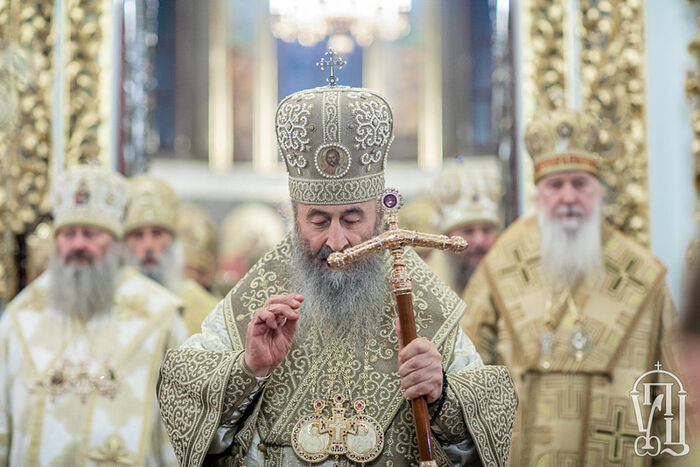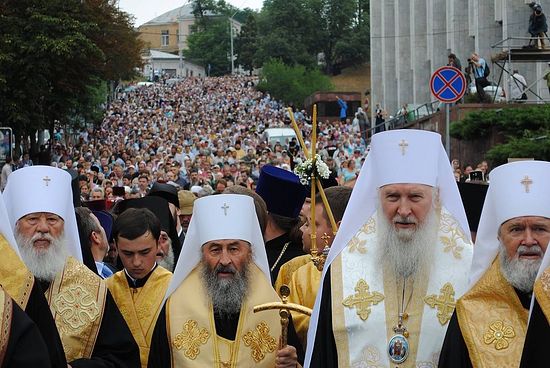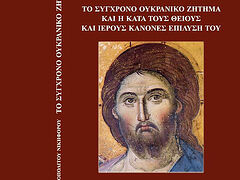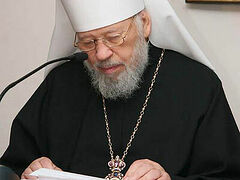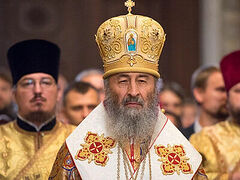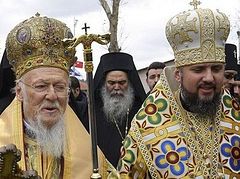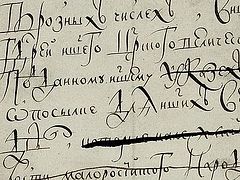Metropolitan Hilarion of Volokolamsk, the Chairman of the Moscow Patriarchate’s Department for External Church Relations, answered questions from the Greek newspaper Kathimerini on the breaking off of Eucharistic Communion, Russian Church unity, and the Council of Crete.
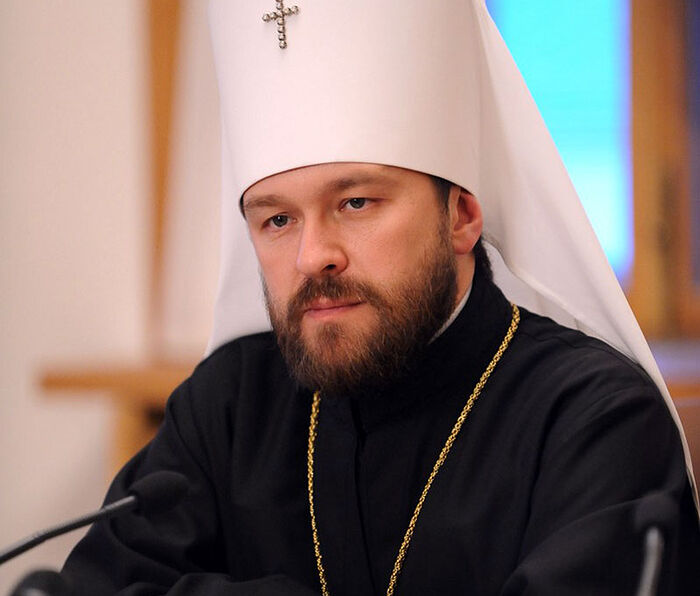 Metropolitan Hilarion (Alfeyev)
Metropolitan Hilarion (Alfeyev)
—How do you assess the situation in world Orthodoxy after the Cyprus crisis? It seems the Russian Orthodox Church is planning to cut off communication with those Churches that recognize the autocephaly of the OCU. What will happen?
—I consider the situation in world Orthodoxy to be very dangerous, critical, and sad. A schism of world Orthodoxy has occurred. It was initiated by Patriarch Bartholomew of Constantinople, and, unfortunately, we see that this schism is still deepening.
I would like to emphasize one thing that is very important for us: The Russian Orthodox Church is observing the development of this schism with regret and sorrow, but it does not participate in it—the schism is happening outside its canonical limits. And when they say to us, “Let’s think of compromise solutions,” we first of all ask ourselves: The Lord has entrusted us with a Church that has existed for more than 1,000 years—it is one Church, the canonical jurisdiction of which extends to Russia, Ukraine, Belarus, and other neighboring states. We received this Church as an inheritance from our ancestors—so what right do we have now to squander this heritage, or, as we say in Russia, to tear it apart?
On the contrary, we are concerned with the strengthening of the unity of our Church, and we can see the striking unity of the episcopate, clergy, and laity throughout its canonical territory. We see the unity of the episcopate of Russia and Ukraine despite the difficult relations that presently exist on the political level between the two countries. And when they tell us to give autocephaly to the Ukrainian Church and then all problems will be resolved, I want to ask: First, what problems can be solved this way, and second, why should we impose autocephaly on the Ukrainian Church if it doesn’t want it?
The Ukrainian Church has very clearly stated through the mouth of its own episcopate that it is fully satisfied with the self-governing status it has today. The idea of autocephaly is very unpopular among the Church people, especially since it is completely discredited by the schismatics. How can we talk about autocephaly in this situation?
We will continue to strengthen the internal unity of our Church, and what our brothers in the Cypriot, Greek, and Alexandrian Churches do—let it remain on their conscience. They will answer for it before God. And we in the Russian Church will give an answer before God for whether we preserved or destroyed the unity of our Church.
There’s something else I’d like to say. We are not breaking communion with the Churches—we remain in communion with all hierarchs of the Local Orthodox Churches who stand guard over the canonical Tradition of the Church and do not recognize the Ukrainian schismatics. This is what we will continue to do. We break communion only with those primates and hierarchs who enter into communion with the schism, and we do this because the holy canons command us to do so. We cannot recognize people who have no canonical consecration as people with whom we can enter into Eucharistic communion.
—Can this question be solved as conflicts between the Ecumenical Patriarchate and the Russian Orthodox Church have been solved in the past? In particular, there is the example of Estonia immediately after the collapse of the USSR. There are also voices, including those of well-known figures such as Archbishop Anastasios of Albania, calling for certain initiatives to find a compromise. Is there such hope? You met with Archbishop Elpidophoros in New York— was that the beginning of a dialogue?
—We are open to dialogue, but the Patriarch of Constantinople closed the door to it. When Patriarch Kirill went to Constantinople in August 2018 to personally meet with Patriarch Bartholomew, they spoke for more than two hours. I was present at this meeting, where Patriarch Kirill laid out the real situation for Patriarch Bartholomew.
Patriarch Bartholomew was misinformed, first by the Ukrainian schismatics, second by the Ukrainian authorities of that time, and third, by his incompetent advisers. For some reason he was sure that as soon as the “tomos of autocephaly” was signed, many hierarchs of the Ukrainian Church would immediately join the newly-created “church.” Patriarch Bartholomew told us that, according to their information, twenty-five hierarchs were already prepared to do this. Patriarch Kirill responded that one or two bishops would switch. And indeed, out of nearly 100 hierarchs, only two—one diocesan and one vicar bishop—moved into this so-called church created on the basis of schismatics.
Among the disciples of Jesus Christ were the twelve apostles, one of whom was Judas. We had nearly 100 hierarchs in the Ukrainian Church (now there are more than 100), and two of them turned out to be traitors. So, the percentage of betrayal in our Ukrainian Orthodox Church is much lower.
The Ukrainian Orthodox Church has always existed. It is a huge Church with 12,500 parishes, more than 250 monasteries, thousands of clerics, more than 100 hierarchs, and millions of faithful. The episcopate, clergy, and laity are a very close-knit community, and none of them want to join any supposedly autocephalous “church” created on the basis of schismatic structures.
If we talk about a compromise and compare the situation with Estonia, we have to keep in mind that the situation was somewhat different there. In Estonia, the Patriarch of Constantinople, in his words, “recreated” the jurisdiction that existed in the interwar period, and not on the basis of schismatics who had no canonical consecrations—some clergy of the Russian Orthodox Church entered the “recreated” jurisdiction, and a bishop with a canonical consecration from the Patriarchate of Constantinople was sent to head it. Therefore, the initial conditions for negotiations were different from the very beginning. Negotiations were held and a compromise was reached. At the same time, it must be said that Constantinople still has not fulfilled the agreements that were reached during the negotiations. Nevertheless, we managed to stop the division that had arisen, and the problem, although not resolved, did not prevent us from having Eucharistic communion with Constantinople in recent years.
In Ukraine, we see something completely different. The Patriarchate of Constantinople invaded the canonical territory of the Russian Orthodox Church. Now Constantinople tells us, it turns out that for more than 300 years, the Ukrainian Orthodox Church was part of the Patriarchate of Constantinople and was only temporarily transferred to the jurisdiction of Moscow. But we have published a whole volume of documents that testify to the contrary. Metropolitan Nikiforos of Kykkos and Tellyria in Cyprus recently published a book with documents that, again, clearly testify that during these more than 300 years, the Ukrainian Church was part of the Moscow Patriarchate.
Look at the calendars of the Church of Constantinople in 2018, 2017, 2016, and all the preceding years—you’ll see the Ukrainian Orthodox Church headed by His Beatitude Metropolitan Onuphry as part of the Moscow Patriarchate. There is no mention of the Patriarchate of Constantinople. Then suddenly Patriarch Bartholomew declares that, it turns out, it’s the canonical territory of the Patriarchate of Constantinople.
Imagine you have a house where you live with your children, where your parents lived, and your grandparents, and all your ancestors for more than 300 years. And suddenly someone comes and says: “You know, many years ago, our family gave this house for your family to use temporarily. We have found some documents, so get out of the house, and we’re going to settle new people here.” This is basically what happened in Ukraine.
Now the Patriarchate of Constantinople says that he only “condescends to tolerate” the presence of His Beatitude Metropolitan Onuphry and the Church he heads in Ukraine. It’s impossible to imagine a more absurd situation.
—Let’s focus a little on the situation in Ukraine. What is the position there of the canonical, as you say, Church (which belongs to the Russian Orthodox Church) in comparison with that which was created by the Ecumenical Patriarch? You refer to the fact that the majority of believers recognize Vladyka Onuphry. You also talk about oppression, which the general public knows little about. Perhaps you’re just exaggerating the situation with the nationalists and the supporters of autocephaly? Could you say more about this?
—I’ll start with the official statistics published by the Ukrainian state authorities. According to this information, the Ukrainian Orthodox Church, a self-governing Church within the Moscow Patriarchate, numbers 12,500 parishes, while the two schismatic jurisdictions together have about 6,000. As for monasteries, the Ukrainian Orthodox Church has more than 250, and all the largest monasteries—the Kiev Caves Lavra, the Pochaev Lavra, the Svyatogorsk Lavra—are in the canonical Church. The schismatic jurisdictions have, in the best-case scenario, a few dozen monasteries. And all you have to do is visit these monasteries to see where there are monastics and where not. Monasticism in Ukraine actually exists only in the canonical Ukrainian Orthodox Church—the schismatics have almost no monasticism as such.
To understand the situation with the faithful going to church, I think it’s enough just to go to Kiev, to go to the Kiev Caves Lavra on a Sunday and see how many people are there. I’ll also mention this fact: Every year, on the eve of the feast of the Baptism of Rus’, there is a large cross procession organized by the canonical Ukrainian Orthodox Church without any pressure from outside—to the contrary, the faithful are pressured to not join in this procession, to not go to Kiev. You can look at the photos, the videos—there are tens and hundreds of thousands of people. About 300,000 faithful gather in a cross procession on this day. Therefore, only wishful thinkers could say that we’re exaggerating something. We have the numbers, the video footage, the official Ukrainian statistics. So, we rely on reality, not on some fantasy.
If we talk about the persecution of the clergy of the canonical Church, such persecution definitely took place during the time of Poroshenko’s presidency. There were raider seizures of churches and priests were attacked. Again, this is all documented: There are numbers, videos of these attacks and the beatings of clerics. As we’ve heard in the media, Patriarch Bartholomew is planning to go to Ukraine next year. I hope that in his undoubtedly very busy schedule he will find half an hour to meet with the families of priests who were thrown out of their churches. Let him meet with them himself and hear what really happened.
—You systematically criticize the Ecumenical Patriarchate for initiating the autocephaly and, moreover, the schism within Orthodoxy. Perhaps there is at least some fault on the part of the Russian Orthodox Church? I’m thinking about how Constantinople accuses you quite often of not going to the Crete Council, although you participated in the preparations up to the last minute.
—I think that part of the blame indeed does lie with us, and I must confess that we made one very big mistake. The topic of autocephaly was discussed throughout the entire pre-conciliar process, but we didn’t manage to find complete harmony on this topic. Basically, we agreed that in the future, autocephaly would not be granted solely by decision of the Ecumenical Patriarch, that the granting of autocephaly would be possible only with the consent of all the Local Churches. It remained only to agree on the form of the signatures under the tomos of autocephaly—no agreement was reached on this point. So what happened next? Patriarch Bartholomew sent a letter to the Local Orthodox Churches with a proposal to remove the topic of autocephaly from the agenda and to hold the pan-Orthodox Council. We agreed with this proposal, and that was our great mistake.
We believed Patriarch Bartholomew, who publicly, in front of all the delegations of the Local Churches said: “We recognize Metropolitan Onuphry and welcome him as the sole canonical head of Orthodoxy in Ukraine.” Those were his words, and we believed his words. We thought: “Since the Ecumenical Patriarch says this, let’s hold a council, and then, as he promised, we will continue to discuss the topic of autocephaly.” We shouldn’t have believed him; he deceived us. This was our great mistake.
As for our non-participation in the Crete Council, you well know how events unfolded. First the Bulgarian Church refused to participate, then the Antiochian Church, then the Georgian Church. Then the Serbian Church said the Council should be postponed. In a situation where four Churches have practically refused to participate, what are we to do?
We always insist that a pan-Orthodox Council should be truly pan-Orthodox, and if any decision is made in the absence of even one Church, it won’t be legitimate for the fullness of Orthodoxy. And suddenly we hear that one Church refuses, another, a third, and the fourth says the Council should be postponed…
Then Patriarch Kirill wrote a letter to Patriarch Bartholomew with a request to hold an urgent pre-conciliar meeting to resolve the existing issues and still invite these Churches to the Council. He received an answer from Patriarch Bartholomew—I have it before me right now—No. 676 from June 9, which says: “The new, extraordinary pan-Orthodox pre-conciliar meeting proposed by your holy Church is considered impossible, because there is no regulatory framework for its convocation.” Who considered it impossible? Why was it impossible? There were still two weeks before the council. Why was it impossible to adopt measures so everyone could participate in the Council?
Having learned that three Churches were not participating, we said then we weren’t going either. Now they tell us, had you gone to the Crete Council, none of the subsequent events would have happened. I heard it from practically every Greek bishop I met with. Excuse me, but why wouldn’t it have happened? It means Patriarch Bartholomew wanted to take revenge on us this way? He decided to give “autocephaly” to the schismatics and “legalize” the anathematized Philaret Denisenko out of a sense of revenge? If you think this is really the case, then what can be said here?
Had we gone to the Crete Council, then, first of all, we would have said that the Council had no legitimacy, because three Churches were absent. So the Council would have fallen through. Having arrived, we would have had to leave.
I would like to remind those who claim that we didn’t want to go from the very beginning that we had been preparing for the pan-Orthodox Council since 1961. A list of 100 topics for the Council was compiled that year, and we worked on all of them. Then they said the list has been reduced to ten topics, and we accepted this. Later they said the topic of diptychs was being dropped because it was too difficult; we also came to terms with this. In the end, they told us the topic of autocephaly also had to be removed because we hadn’t come to an agreement on it. Again, we reconciled ourselves to this. The whole time, we made concessions, obeying the decisions that were made without our participation. As the aforementioned letter said, it was “considered impossible.” But who considered it so? The Patriarchate of Constantinople.
Throughout the entire pre-conciliar process, we proposed to create an inter-Orthodox secretariat of the Council, but this was not done—all the preparation was carried out at the Phanar. And when we went to these meetings, they gave us prepared documents and we began to discuss them. The preparatory process itself was very poorly organized—in reality, the Local Churches were only invited for passive participation. And the poorly-prepared Council ended poorly.

